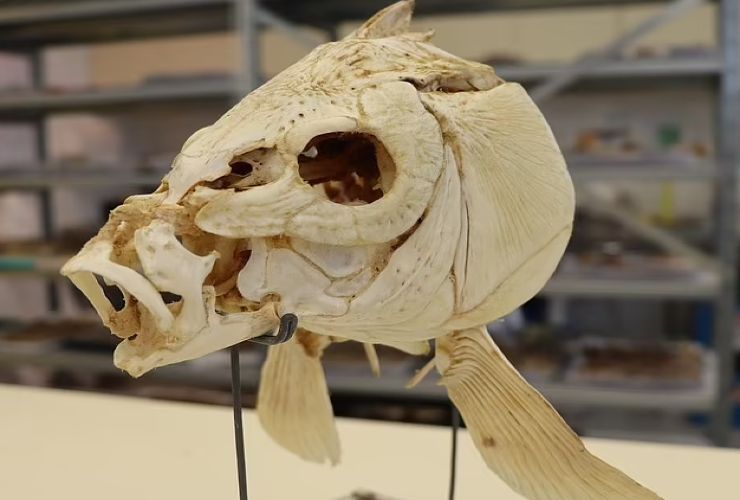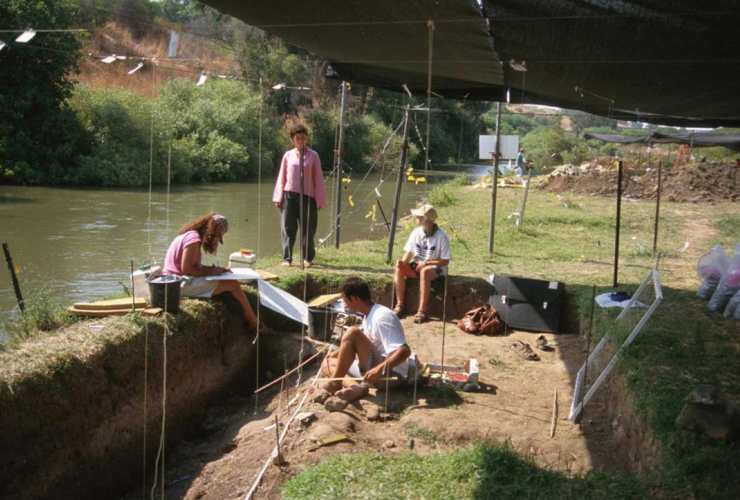The first human-cooked food that archaeologists have found traces of was a large freshwater carp. It dates back 780,000 years, to the Lower Paleolithic. The discovery of the first human culinary “experiments” took place in Israel. Lakes and fish were essential to the diet of early humans.
This was discovered by an international research group led by Irit Zohar of Tel Aviv University. Scientists have analyzed food remains found at the Gesher Benot Ya’aqov site in Israel. The results of the findings have been published in the journal Nature Ecology and Evolution. Our most distant ancestors would therefore have begun the art of cooking hundreds of thousands of years before, as evidenced by the archaeological discoveries found so far.
A reconstruction of the first cooking of food. Photo Twitter @MU_Peter
Cooking food has been one of the great improvements in human nutrition. An innovation that has facilitated the digestibility of food. At the same time, by learning to cook and gradually stopping eating raw foods, men and women began to eliminate the dangerous pathogens they had been accustomed to introjecting until then.
food in prehistory
However, it is not easy for researchers and archaeologists to define with certainty the earliest examples of food cooked by women, presumably from prehistoric times. Various clues seem to indicate that the cooking of food began a million years ago. Consider that the first hominids date back at least 2.5 million years, while Homo Erectus appeared about 1.8 million years ago in Africa. So far, the only really certain evidence pointed to a time period between 400,000 and 300,000 years ago. The international research team led by Irit Zohar from Tel Aviv University analyzed large amounts of fish remains. And especially big carp. As well as human teeth found at the Gesher Benot Ya’aqov site.
 The skull of a prehistoric fish. Photo Twitter @AmirAlhaj_ph
The skull of a prehistoric fish. Photo Twitter @AmirAlhaj_ph
Thanks to in-depth analyses, the researchers were able to determine a new date for the first cooking of food: 780,000 years ago, as mentioned. “These new findings – said Professor Zohar – not only demonstrate the importance of freshwater habitats and the fish they contained for the sustenance of prehistoric man. They also illustrate the ability of prehistoric humans to control fire to cook food and their understanding of the benefits of cooking fish before eating it. The archaeological discovery that took place in Israel emerges a week after the equally important, although of a different kind, that took place in San Casciano dei Bagni (Siena), compared in terms of scientific significance and aesthetic beauty to that of the Riace bronzes.
 The site of Gesher Benot Ya’aqov, Israel, on the banks of the Jordan River. It preserves evidence of ancient bonfires, burnt pistachio seeds and 54 other food plant species that early humans used near the shore of Paleo-Lake Hula 780,000 years ago. Photo Twitter @johnhawks
The site of Gesher Benot Ya’aqov, Israel, on the banks of the Jordan River. It preserves evidence of ancient bonfires, burnt pistachio seeds and 54 other food plant species that early humans used near the shore of Paleo-Lake Hula 780,000 years ago. Photo Twitter @johnhawks